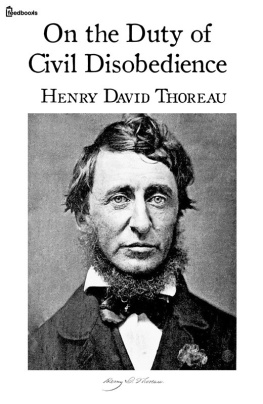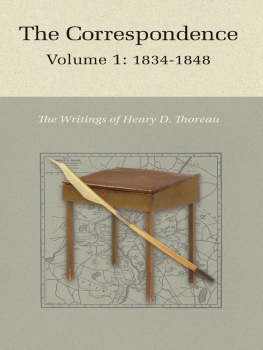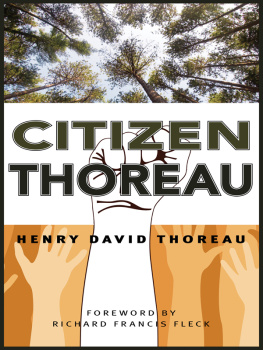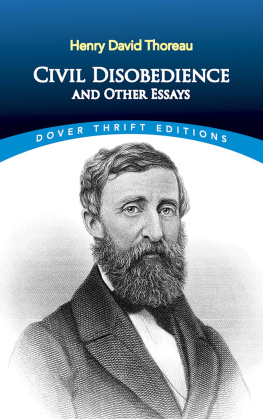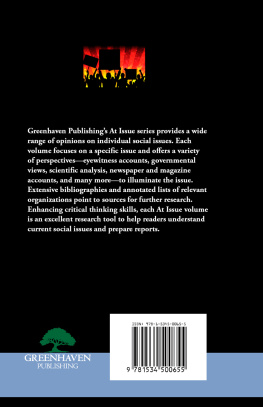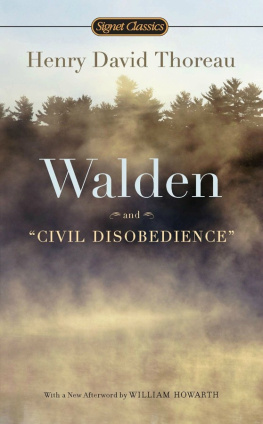Henry David Thoreau - On the Duty of Civil Disobedience
Here you can read online Henry David Thoreau - On the Duty of Civil Disobedience full text of the book (entire story) in english for free. Download pdf and epub, get meaning, cover and reviews about this ebook. year: 1849, publisher: Feedbooks, genre: Science. Description of the work, (preface) as well as reviews are available. Best literature library LitArk.com created for fans of good reading and offers a wide selection of genres:
Romance novel
Science fiction
Adventure
Detective
Science
History
Home and family
Prose
Art
Politics
Computer
Non-fiction
Religion
Business
Children
Humor
Choose a favorite category and find really read worthwhile books. Enjoy immersion in the world of imagination, feel the emotions of the characters or learn something new for yourself, make an fascinating discovery.
- Book:On the Duty of Civil Disobedience
- Author:
- Publisher:Feedbooks
- Genre:
- Year:1849
- Rating:5 / 5
- Favourites:Add to favourites
- Your mark:
- 100
- 1
- 2
- 3
- 4
- 5
On the Duty of Civil Disobedience: summary, description and annotation
We offer to read an annotation, description, summary or preface (depends on what the author of the book "On the Duty of Civil Disobedience" wrote himself). If you haven't found the necessary information about the book — write in the comments, we will try to find it.
On the Duty of Civil Disobedience — read online for free the complete book (whole text) full work
Below is the text of the book, divided by pages. System saving the place of the last page read, allows you to conveniently read the book "On the Duty of Civil Disobedience" online for free, without having to search again every time where you left off. Put a bookmark, and you can go to the page where you finished reading at any time.
Font size:
Interval:
Bookmark:


Published: 1849
Categorie(s): Non-Fiction, Social science, Politicalscience
Source: http://en.wikisource.org
Henry David Thoreau (July 12, 1817 May 6, 1862; born DavidHenry Thoreau) was an American author, naturalist,transcendentalist, tax resister, development critic, andphilosopher who is best known for Walden, a reflection upon simpleliving in natural surroundings, and his essay, Civil Disobedience,an argument for individual resistance to civil government in moralopposition to an unjust state. Thoreaus books, articles, essays,journals, and poetry total over 20 volumes. Among his lastingcontributions were his writings on natural history and philosophy,where he anticipated the methods and findings of ecology andenvironmental history, two sources of modern day environmentalism.He was a lifelong abolitionist, delivering lectures that attackedthe Fugitive Slave Law while praising the writings of WendellPhillips and defending the abolitionist John Brown. Thoreausphilosophy of nonviolent resistance influenced the politicalthoughts and actions of such later figures as Leo Tolstoy, MohandasK. Gandhi, and Martin Luther King, Jr. Some anarchists claimThoreau as an inspiration. Though Civil Disobedience calls forimproving rather than abolishing government I ask for, not atonce no government, but at once a better government thedirection of this improvement aims at anarchism: That governmentis best which governs not at all; and when men are prepared forit, that will be the kind of government which they will have.Source: Wikipedia
- Walden(1854)
http://www.feedbooks.com
Strictly for personal use, do not use this file for commercialpurposes.
I heartily accept the motto, "That government is best whichgoverns least"; and I should like to see it acted up to morerapidly and systematically. Carried out, it finally amounts tothis, which also I believe "That government is best which governsnot at all"; and when men are prepared for it, that will be thekind of government which they will have. Government is at best butan expedient; but most governments are usually, and all governmentsare sometimes, inexpedient. The objections which have been broughtagainst a standing army, and they are many and weighty, and deserveto prevail, may also at last be brought against a standinggovernment. The standing army is only an arm of the standinggovernment. The government itself, which is only the mode which thepeople have chosen to execute their will, is equally liable to beabused and perverted before the people can act through it. Witnessthe present Mexican war, the work of comparatively a fewindividuals using the standing government as their tool; for, inthe outset, the people would not have consented to thismeasure.
This American government what is it but a tradition, though arecent one, endeavoring to transmit itself unimpaired to posterity,but each instant losing some of its integrity? It has not thevitality and force of a single living man; for a single man canbend it to his will. It is a sort of wooden gun to the peoplethemselves. But it is not the less necessary for this; for thepeople must have some complicated machinery or other, and hear itsdin, to satisfy that idea of government which they have.Governments show thus how successfully men can be imposed on, evenimpose on themselves, for their own advantage. It is excellent, wemust all allow. Yet this government never of itself furthered anyenterprise, but by the alacrity with which it got out of its way.It does not keep the country free. It does not settle the West. Itdoes not educate. The character inherent in the American people hasdone all that has been accomplished; and it would have donesomewhat more, if the government had not sometimes got in its way.For government is an expedient by which men would fain succeed inletting one another alone; and, as has been said, when it is mostexpedient, the governed are most let alone by it. Trade andcommerce, if they were not made of india-rubber, would never manageto bounce over the obstacles which legislators are continuallyputting in their way; and, if one were to judge these men wholly bythe effects of their actions and not partly by their intentions,they would deserve to be classed and punished with thosemischievous persons who put obstructions on the railroads.
But, to speak practically and as a citizen, unlike those whocall themselves no-government men, I ask for, not at once nogovernment, but at once a better government. Let every man makeknown what kind of government would command his respect, and thatwill be one step toward obtaining it.
After all, the practical reason why, when the power is once inthe hands of the people, a majority are permitted, and for a longperiod continue, to rule is not because they are most likely to bein the right, nor because this seems fairest to the minority, butbecause they are physically the strongest. But a government inwhich the majority rule in all cases cannot be based on justice,even as far as men understand it. Can there not be a government inwhich majorities do not virtually decide right and wrong, butconscience? in which majorities decide only those questions towhich the rule of expediency is applicable? Must the citizen everfor a moment, or in the least degree, resign his conscience to thelegislation? Why has every man a conscience, then? I think that weshould be men first, and subjects afterward. It is not desirable tocultivate a respect for the law, so much as for the right. The onlyobligation which I have a right to assume is to do at any time whatI think right. It is truly enough said that a corporation has noconscience; but a corporation of conscientious men is a corporationwith a conscience. Law never made men a whit more just; and, bymeans of their respect for it, even the well-disposed are dailymade the agents of injustice. A common and natural result of anundue respect for law is, that you may see a file of soldiers,colonel, captain, corporal, privates, powder-monkeys, and all,marching in admirable order over hill and dale to the wars, againsttheir wills, ay, against their common sense and consciences, whichmakes it very steep marching indeed, and produces a palpitation ofthe heart. They have no doubt that it is a damnable business inwhich they are concerned; they are all peaceably inclined. Now,what are they? Men at all? or small movable forts and magazines, atthe service of some unscrupulous man in power? Visit the Navy-Yard,and behold a marine, such a man as an American government can make,or such as it can make a man with its black arts a mere shadow andreminiscence of humanity, a man laid out alive and standing, andalready, as one may say, buried under arms with funeralaccompaniments, though it may be,
"Not a drum was heard, not a funeral note,
As his corpse to the rampart we hurried;
Not a soldier discharged his farewell shot
O'er the grave where our hero we buried."
[Charles Wolfe The Burial of Sir John Moore at Corunna ]
The mass of men serve the state thus, not as men mainly, but asmachines, with their bodies. They are the standing army, and themilitia, jailers, constables, posse comitatus, etc. In most casesthere is no free exercise whatever of the judgment or of the moralsense; but they put themselves on a level with wood and earth andstones; and wooden men can perhaps be manufactured that will servethe purpose as well. Such command no more respect than men of strawor a lump of dirt. They have the same sort of worth only as horsesand dogs. Yet such as these even are commonly esteemed goodcitizens. Others as most legislators, politicians, lawyers,ministers, and office-holders serve the state chiefly with theirheads; and, as they rarely make any moral distinctions, they are aslikely to serve the devil, without intending it, as God. A veryfew as heroes, patriots, martyrs, reformers in the great sense,and men serve the state with their consciences also, and sonecessarily resist it for the most part; and they are commonlytreated as enemies by it. A wise man will only be useful as a man,and will not submit to be "clay," and "stop a hole to keep the windaway," but leave that office to his dust at least:
Font size:
Interval:
Bookmark:
Similar books «On the Duty of Civil Disobedience»
Look at similar books to On the Duty of Civil Disobedience. We have selected literature similar in name and meaning in the hope of providing readers with more options to find new, interesting, not yet read works.
Discussion, reviews of the book On the Duty of Civil Disobedience and just readers' own opinions. Leave your comments, write what you think about the work, its meaning or the main characters. Specify what exactly you liked and what you didn't like, and why you think so.

